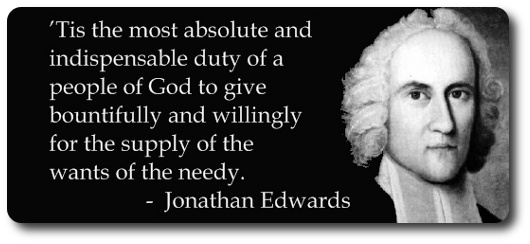
Jonathan Edwards (1703-1758) stands as one of American histories greatest intellectuals. Perhaps best known today for his classic sermon, “Sinners in the Hands of an Angry God,” Edwards engaged in a wide scope of interests including theology, philosophy, and metaphysics. I have found his treatise on “The End For Which God Created the World” and “Religious Affections” particularly helpful in shaping my own world view. Many of you would enjoy “The Life of David Brainerd” which provides a fascinating look at early American missionary work.
For those interested in mercy ministry, especially here with Rebuild Lakeshore, I highly recommend Jonathan Edwards work on “Christian Charity” entitled “The Duty of Charity to the Poor, Explained and Enforced.” I know of no better biblical treatment on the subject. Written over 275 years ago, you might think his observations and insights would prove outdated. Nothing could be further from the truth. Beginning with a sound exegesis of Deuteronomy 15:7-11, Edwards builds a strong case of Christian charity as a core scriptural mandate. His fourth section, that answers common objections to mercy ministry, could have been written today and convicts my heart every time I read it. Let me urge you to set some time aside for reading and considering “Christian Charity: The Duty of Charity to the Poor, Explained and Enforced.”

Speaking of Jonathan Edwards, let me also recommend a book by one of my favorite preachers today, Steve Lawson, entitled “The Unwavering Resolve of Jonathan Edwards.” Published by Reformation Trust, Lawson offers his second installment in his “Long Line of Godly Men Profiles” series. The work traces major themes through Jonathan Edwards 70 personal resolutions he penned early in his life. Lawson illustrates his implementation of these resolutions with excerpts from Edward’s diary and other writings. This format creates a unique biography that focuses, not as much on a linear recap of his life and achievements, but more on the internal spirituality of the man and how his personal piety effected his relationship with God and others. Lawson holds up Edward’s pursuit of holiness as a model for Christian holiness. Lawson closes each chapter with a challenge to his readers to discipline yourself for the purpose of godliness and the glory of God. Very good.
You may also want to listen to Mark Dever preaching Edward’s sermon “Sinners in the Hands of an Angry God” and a great biographic sketch of Edwards life by John Piper: “The Pastor as Theologian: Life and Ministry of Jonathan Edwards.”
